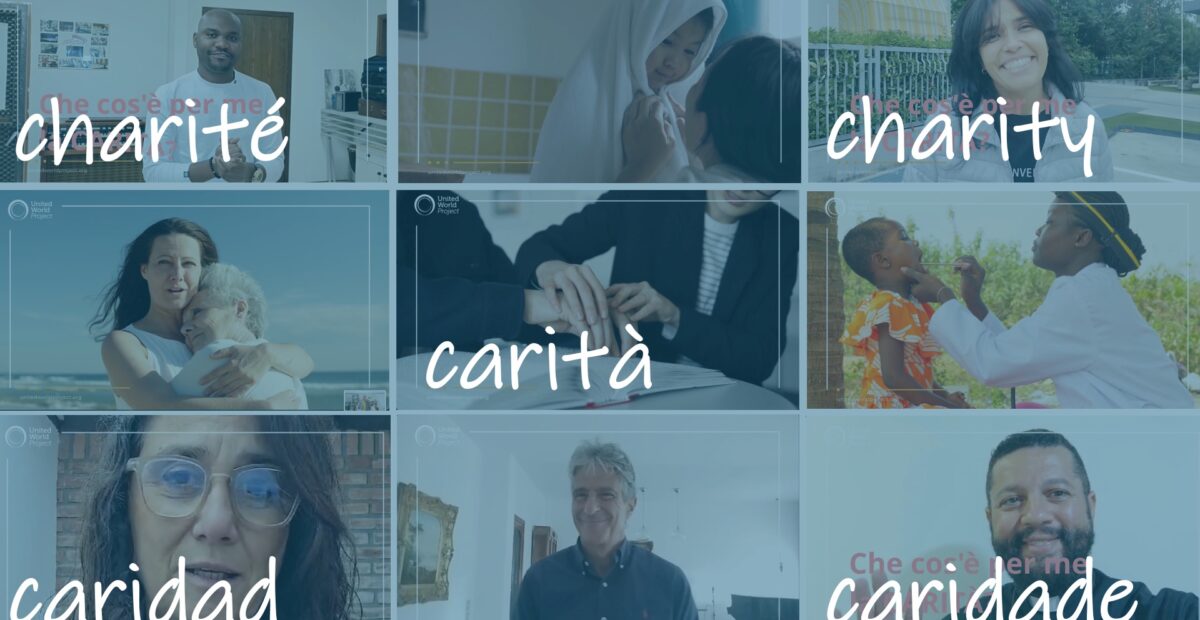
Watch
The priceless value of charity

This month, we asked a whole chorus of voices to help us in our task of speaking of the greatness of charity, the theme of our September newsletter.
What is charity? – we asked ourselves, in the editorial. It is not an easy question to answer, because charity is something so precious and demanding. So, we asked lots of people from different nationalities, cultures, religions, professions and social outreach to tell us their own understanding of what charity means and how they incarnate it in their work.
A rabbi from Argentina, Silvia Chemen, gave us this reply: “Charity is much more than a charitable gesture towards someone in need. Much more than almsgiving. Much more than an act of compassion towards someone who is lacking something, or unable to do something. The word ‘caridad’, in Spanish, shares the letters ‘cara’, which means face, and this is what charity means to me: not turning a blind eye when I encounter the face of my neighbour, but rather seeing him or her in all their humanity, to discover them beyond the circumstances in which we find ourselves, as children of God.
In the words of the Jewish philosopher Emmanuel Levinas, it is when I encounter the face of my neighbour, that true ethics begins. Charity is the measure by which our religions speak of ethics, of our responsibility towards one another”.
Don Fabio Pieroni, parish priest of San Bernardo of Chiaravalle in Rome, described it like this: “Charity is not a way to do things better: it is the reason for what I do. If I were to give my body to be burned, but without charity, it would benefit me nothing. Sacrifices are useless if they are done in the hope of reward or to win the approval of others. Charity is communion with God. Christ’s love is compelling. Charity is not a way of living, it is God himself living in me. Without grace, without the flame of God’s love alive in me, things do not work. We must be careful in our reading of the letter of St James not to think that faith depends only good deeds. Both are equal.
For María Andreína Rivera Muñoz, from Venezuela, a singer in Gen Verde, “Charity is love that is concrete, such as listening to others without expecting anything in return. It means being ready to put myself aside. Working in Gen Verde gives me lot of opportunities, such as when I had to take someone’s place on stage, even though I was afraid of making a mistake. Or yesterday, when we were cleaning, I had already finished but someone else could not manage to finish their task, so I willingly did it for them in order to love, which also means to forgive, not stopping to think about whether they had the time or ability to do it themselves. Just throwing myself into loving. It’s a wonderful adventure”.
Jean Paul Wasukundi from Gen Rosso, also a performing artist, echoes what María says. He is from the Democratic Republic of Congo. “Charity is deeply important for the whole world. It is learning to love in a simple and practical way. How do I do this in my work? By promoting and sustaining social and cultural projects that provide a space for young artists and by writing songs that speak of peace, unity and fraternity. Songs with a message of courage and hope for those who need it most”.
Padre Milton Satiro, from Brazil, says: “Charity is what what makes me feel alive. I exist when I love. It is giving back to God all that we have received from Him”.
Charity is ‘so intriguing’, explains Riccardo Bosi, a paediatrician (and author) from Italy. “In my work I come into contact with many children and families who are vulnerable because they are migrants. It is a wonderful opportunity to put myself in an attitude of love, between doctor and patient, of being there to look after them, not to cure them. It helps us overcome tremendous barriers of culture and language. I do my job so much better when I am in a disposition of love. It is not about producing a stethoscope from my doctor’s bag, full of clever instruments, or being capable of delivering a clinical diagnosis or therapy, but rather of having an invisible instrument that over time has become my pole star and compass.
Returning to the field of art, more precisely of theatre, we listened to the thoughts of Alessio De Caprio, actor, dramatist, author and producer of Bucefalo The Boxer, a moving monologue of the tragic story of Lazzaro Anticoli, a Jew from Rome, who was killed in the Ardeatine massacre by the German occupation troops on 24th March 1944. “Charity”, said Alessio, “happens when part of myself dies in order to give something to someone else. It happens above all when I listen to the other person, when I do something for him, not for myself. When I realise that happiness lies, not in myself but in the other person. When I play my part as an actor or lead workshops, there is a moment in which it is necessary to listen and be able to look the other person in the eye, in order in order to leave the predetermined path and welcome the path that only relationship can create”.
Finally, the beautiful testimony of Carlos Freire, editorial assistant of ‘Living City’, Canada. “For me, charity is the capacity to recognise the infinite dignity of every person and to act accordingly,’ he explained, ’and every person really means every person. As Chiara said: the likeable and the unlikeable, the young and the not so young, the beautiful and the not so beautiful. And today we could add some categories that were not explicit eighty years ago”. On the way he embodies charity in his work, he added: “In my work with Living City (the magazine published by Focolare Media in North America) I try to do my part to ensure that the magazine promotes this vision of charity, which is the necessary element for growing unity and realising Jesus’ dream of universal brotherhood”. Carlos concluded as follows: “Today’s reality (those new categories I was referring to) asks us to address difficult issues and challenging conversations. Living City does not shy away from these challenges. My wish, and that of our team, is that we do so with charity, always recognising and honouring that infinite dignity of each person”.






